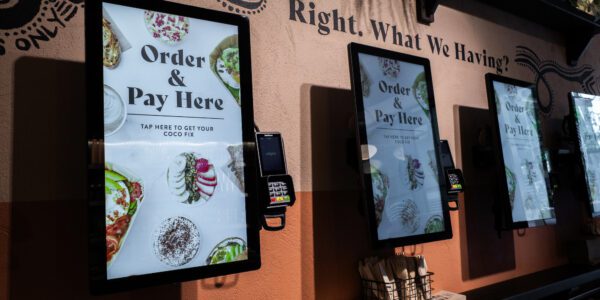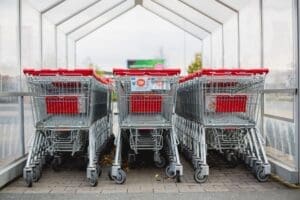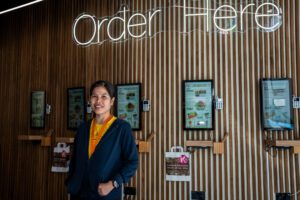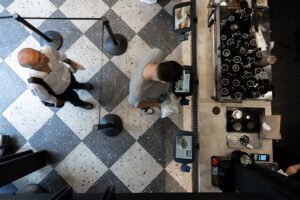7 incredible benefits of using self service kiosks in your restaurant
Self serve kiosks aren’t just for McDonalds any more. Discover the financial and operational benefits of kiosks and why they might be right for your restaurant.

Learn how the retail sector has managed to make tech an essential part of the customer experience, and other lessons that hospitality can benefit from.
Hospitality and retail – both are cutthroat industries where profit margins can be narrow, buyer habits unpredictable and success requires speed, quality and excellent customer service.
However, where retail has been radically transformed by innovation, shifting over to e-commerce and digital, restaurants have largely clung onto their traditional systems and culture.
But as Shereen Ritchie – CEO of Buns From Home stated – “turbulent is the new normal” for the hospitality industry. For your restaurant business to survive – and to thrive – you must be willing to pivot, not only to introduce digital solutions, but to adapt your business model to suit the new era of customer habits.
As hospitality moves to more widely embrace tech, retail’s history can provide valuable lessons; what to change, and how to do it well. We’ve got the top five below.

Think about your weekly grocery shop. You grab your items, head to the tills, and face a choice between the cashier (with a long queue of shoppers waiting to purchase tobacco or lottery cards), or the self-checkout (queue-free).
It’s a no-brainer.
You scan your groceries and loyalty card to score some discounts, and you’re on your way in just a couple of minutes. There’s no need to even take out your AirPods if you don’t want to – it’s completely seamless. Nowadays, you can have a nearly identical experience in a high street retail shop.
Hospitality businesses have an opportunity to use clever technology to iron out the stickier parts of the customer experience, even in person.
Tech can help enable your customers to click and collect or grab and go. It can facilitate online ordering with quick delivery from your sites for speed, choice and convenience. With today’s customer spending so much time online, it’s crucial to meet them where they are and enable them with the options to purchase how they most prefer.
Get tech right, and your customers will embrace it.
Book a chat with an expert to discover how to simplify operations, increase revenue, and grow your business – in a way your customers will love.
But with all that said, it’s equally important to provide a bespoke and pleasant customer experience with a human element, even when you’re leveraging tech in the buying journey.

It’s especially vital to have a human representing your brand when things go wrong, for example if your customer’s favourite side salad is out of stock or if they received the wrong item from an online order. The last thing they want is to deal with a faceless chatbot that can’t resolve their issue.

Imagine you’re back at the grocery store, except as soon as you walk in, the tills are the first thing you see, the queue of customers is blocking your way, and the baskets for your shop are way at the back. Not a great way to get what you need.
When you’re integrating tech like kiosks or tablets into a physical site, it’s important to keep your customer’s point of view top of mind when designing the space. Space planning means arranging your site space to optimise your customer’s experience and make operations as efficient as possible.

“No one restaurant is the same. So how do we look at that guest journey and say where the kiosks are going to be versus the tills? How do we manage that guest flow of click and collect versus kiosk? We have to think about the interior layout and signage,” said Mariam French, Marketing Director at LEON.
Another win from retail is how the industry has saved on labour costs while enabling its teams to become more agile, all thanks to tech taking on manual, mundane tasks that can be easily automated.
Generally, reducing labour costs, which is common during tough economic times, comes at the cost of customer experience. But kitting out your site with smart tech like digital order channels or a Kitchen Management System cuts inefficiencies, and allows your people to focus on more important tasks that need their attention. These are tasks that tech can’t replicate, like warmly greeting customers, solving complex problems or resolving the odd issue for a dissatisfied customer.

Who doesn’t love a loyalty scheme? With the right scheme, you can set up incentives for customers to come back to your business over and over. And crucially, you can collect data on your customer’s buying habits to understand more about how they purchase, providing you with insights to deliver them even more value.
Picture this: hospitality businesses make loyalty as seamless and engaging as retail companies do. Your customer simply scans a card at the checkout, earns rewards to spend more at your establishment next time, and keeps coming back. And you’ve also got the data and insights on what, when and how they like to buy, to offer them personalised content. Dream scenario – but to get it right, you need the right technology in place.
Your loyalty scheme needs to be connected however your customers order – online, in person, or at a kiosk – with a single rewards. This way, customers have an incentive to engage with your loyalty scheme on every single channel, much like they do at the supermarket.
Ready to scale your business? Book a demo and discover how you can increase revenue, operate more efficiently, and build the foundations for long-term growth.
Self serve kiosks aren’t just for McDonalds any more. Discover the financial and operational benefits of kiosks and why they might be right for your restaurant.

Learn the benefits of centralising your hospitality data, and how easy-to-read, real-time reports will help you scale your business.

Find out how you can tidy up your burger brand operations and give it the strong foundation it needs to grow, with solutions to seven top challenges for burger businesses.
